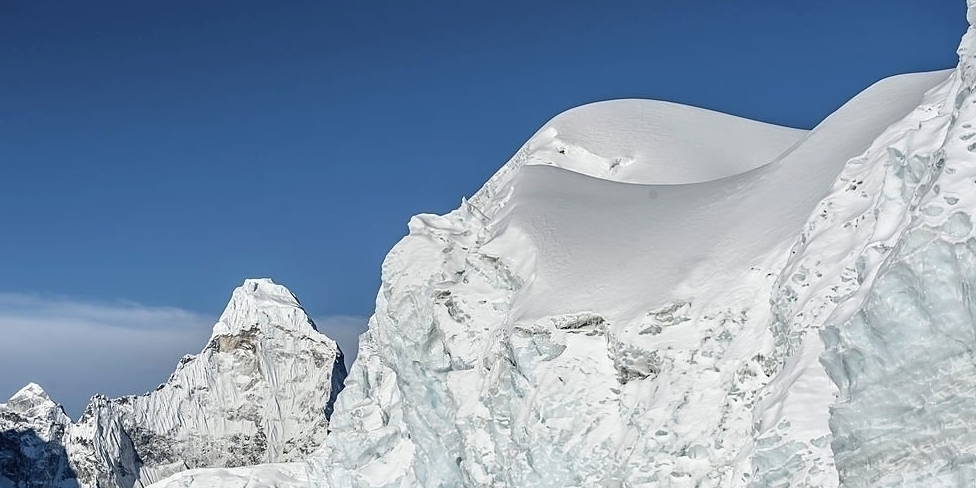


Are you up for a journey that will push you beyond your boundaries, ignite your sense of adventure, and leave you with memories to last a lifetime? The Everest Base Camp (EBC) Trek with Island Peak Climbing is an excursion that combines the thrill of traveling to the base of the world's highest peak with the thrill of summiting a difficult Himalayan peak. This one-of-a-kind trip provides an amazing experience for experienced trekkers and mountaineers as well, pushing them to their limitations and immersing them in the breathtaking grandeur of the Khumbu region. However, it doesn't come without challenges. The EBC journey, along with Island Peak climbing, involves several challenges that necessitate not just physical strength and mental fortitude, but also technical expertise and meticulous planning. In this blog, we will dive into the complexities of this extraordinary trip, examining the challenges that make it both tough and wonderfully rewarding. So lace up your boots, pack your determination, and get ready for an incredible trip that will take you closer to the sky-scraping summit of Island Peak while immersing you in the iconic sceneries of the Everest area.
The legendary Everest Base Camp Trek, a pilgrimage for travelers from throughout the world, is at the center of this expedition. The tour begins with an exciting flight from Kathmandu to Lukla, a little mountain hamlet perched at an elevation of 2,860 meters (9,383 ft). Trekkers then start on a multi-day trip through scenic Sherpa communities, old monasteries, and spectacular mountain vistas. The trail steadily ascends, passing steep inclines and rocky terrain, taking trekkers to the famed Everest Base Camp, which is located at an elevation of 5,364 meters (17,598 feet). This achievement alone demonstrates one's overall health and determination.
The adventure, however, does not end at the Base Camp. The Island Peak, also known as Imja Tse, awaits those looking for a more difficult challenge. Island Peak, at 6,189 meters (20,305 feet), beckons with its snow-covered slopes and the promise of an unequaled sensation of achievement upon reaching its top. This tremendous summit, though, is not intended for the faint of heart.
The summit of an island peak is categorized as moderately difficult to reach. Depending on the alternative path, this trip will take 14 to 18 days to accomplish, with only around two days set up for climbing. The summit elevation of the Island peak is 6,189m/20,305ft.
Typically, Island peak climbing and trekking lead to Everest Base Camp and then back to Chhukung; if you did this, it would be more worthwhile for acclimatization and would be beneficial. Following Chhukung, the path leads to the island's top base camp, high camp, and summit. As a result, peak climbing difficulty is always uphill in high elevations, and it is dependent on your hiking and trekking preparation. Although it is a moderately difficult trek it includes the following major challenges:
The high altitude is one of the most demanding aspects of the EBC journey with Island Peak climbing. The journey begins in Lukla, which is already at an elevation of 2,860 meters (9,383 feet). The altitude steadily rises as you approach the Khumbu Valley, reaching a peak of 5,545 meters (18,192 feet) at Kala Patthar. The top of Island Peak is 6,189 meters (20,305 ft) high.
Acclimatization is the key to overcoming altitude-related problems. Rest days and acclimatization pauses at Namche Bazaar, Dingboche, and Lobuche are thoughtfully planned to help your body acclimate to the decreasing oxygen levels. During this adventure, adequate water, a calm and steady pace, and careful monitoring of altitude sickness symptoms are essential.
The EBC trek with Island Peak climbing covers a variety of terrains, each with its own set of challenges. Steep ascents and descents, narrow and rocky routes, suspension bridges, and icy portions are all part of the track. The Khumbu Icefall, a notable stumbling block on the Everest climb, necessitates technical abilities and the support of experienced Sherpas or guides.
Mountaineering equipment such as crampons, ice axes, and ropes are required for climbing Island Peak. The climb entails navigating crevasses and steep icy slopes. To ensure safety and a successful summit, prior climbing experience or the support of a certified guide is highly recommended.
The weather in the Himalayas is notoriously unpredictable, and the EBC expedition with Island Peak climbing is no exception. The walk is often undertaken between the pre-monsoon (spring) and post-monsoon (fall) seasons when the weather conditions are rather steady. Trekkers may confront high winds, unexpected temperature dips, snowfall, and restricted visibility even during these seasons.
It is critical to be prepared for adverse weather by carrying proper equipment such as warm clothing, waterproof layers, and sturdy footwear. It is critical to monitor weather forecasts and follow the advice of expert guides to ensure safe passage in severe weather.
The EBC trek with Island Peak climbing, is physically hard and requires a high level of fitness and endurance. Long days of walking on various terrain, steep ascents, and carrying a backpack all contribute to the physical strain. Hiking, jogging, and strength training, for example, can help prepare the body for the rigors of the voyage.
Furthermore, mental fortitude is important in overcoming obstacles. The trek's length, physical hardship, and the possibility of altitude-related pain can all put one's mental fortitude to the test. Staying positive, keeping a steady pace, and getting inspiration from the breathtaking scenery and camaraderie of fellow trekkers are critical in overcoming mental obstacles.
The EBC journey combined with Island Peak climbing is a unique adventure that requires physical strength, mental fortitude, and a willingness to embrace the unknown. High altitude, difficult terrain, extreme weather conditions, and the requirement for expert climbing skills make this journey a true test of one's talents.
However, the returns are equally impressive. The beautiful vistas of the Himalayan peaks, the sense of accomplishment that comes with reaching Everest Base Camp, and the excitement of standing on the summit of Island Peak make every effort worthwhile.
